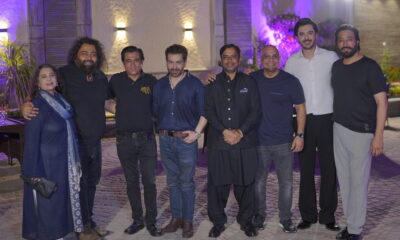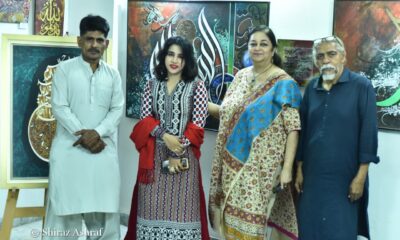Entreprenurs
From Sidelines to Spotlight

Meet Alisha Junaid – a Pakistani-American born in California – who is part of Pakistan Volleyball national team as well as the founder of Empower Sports Academy – a non-profit organisation dedicated to transforming the dreams of women athletes in Pakistan into reality and create safe spaces for women so that they can reach their full athletic potential in indoor sports.
GLAM magazine sat down with Alisha to learn what sparked her passion for sports and led her to establish Empower Academy, their activities and what’s on the horizon for this ambitious young entrepreneur.
GLAM: Tell us how did you get into sports, particularly volleyball and how long have you been playing it?
ALISHA JUNAID: I have been playing sports ever since I was young. I have been a swimmer for almost seven to eight years now. But after Covid hit, I decided I wanted to be part of a team sport, where I could collaborate with more people. I had a couple of friends who played volleyball, I started out with them and within no time fell in love with the sport. It is a very unique game and I felt like it is a great community in the US, in Pakistan and across the world.
GLAM: How did you become part of the women’s volleyball team in Pakistan?
AJ: It was while I was visiting Pakistan for holidays that I wanted to play volleyball because I did not want to be off training. Luckily I found a place in Karachi where I met one of the girls who played on the national team and she introduced me to some of the local coaches. We did a try-out and it went on from there.
GLAM: How did Empower Academy come about?
AJ: Well, the first time I trained with the national team, I felt that a lot of these girls are very passionate and athletic. They just needed more opportunities to grow. I could see their potential and really wanted to do something for them. That’s when the idea of setting up an academy came about. Right now we have started out with volleyball and we are helping out the national team but once we have built our facility, I really want it to expand to all women sports – indoor and outdoor – so that we can get as many women as possible to play, get educated, as well as learn that there is a lot out there for them.
GLAM: Tell us about these girls who are part of the national team. What are their aspirations, their socio-economic backgrounds and how supportive are their families?
AJ: The national women volleyball team is currently comprised of girls from different backgrounds. Some are leaving their villages for the first time to play. Also, what we’ve noticed is that despite the common conceptions, there are girls playing sports and a lot of them have really supportive parents; especially fathers who are willing to send their daughters out as long as they know there is a safe space for them to play. I think that is really good as we need to build on more of these safe places so that we can motivate more girls whose families are willing to send them.
GLAM: What kind of training are you offering these girls, and if you could also tell us a little about the international coaches Empower has hired to train them…
AJ: We were able to find an exceptional coach named Allesandra, through Empower’s board members throughout the world, including Giovanni Guidetti, Denise Sheldon. Allesandra has been with us for about four months now she has been training with her twice a day. Normally, they will do either skill training or athletic training in the morning and some game play in the evening. They will follow this routine for five or six days and then they will have some time off one day to rest their bodies.
Soon we will be taking the team to Italy for a three-week training camp where they would play a lot of practice matches. Empower has organised everything and our coach has put in a lot of effort in finding out the right places to play, for the team to stay, as well as the sponsors and we are really thankful for that.
GLAM: How difficult was it to get a foreign trainers on board?
AJ: Surprisingly, it was not too difficult. We made sure they enjoyed Pakistan AND that we were able to show them the good side of the country – not the side which people are usually shown in the media. We have had three coaches come to Pakistan so far and they all loved the country. The only thing that they struggle with is not having enough facilities or proper equipment to train the girls. It is hard when they are limited to such small space.
GLAM: So have these foreign trainers training local coaches as well?
AJ: Yes absolutely. We have two local coaches with the national team to make sure they are always learning. Also, let me add, we already have a few very good coaches in the country. It is just that we are bringing in a different perspective through foreign coaches that the team really need… just to reach that extra level.
Could you give us details on the Talent Hunt Program 2023 as well as the Pakistan Camp Empower organised?
For the Talent Hunt, we worked with the Prime Minister Youth Foundation and it entailed really just to go all over Pakistan so that we could find girls fit for the national team, and whether they had the athletic potential. It was also an opportunity for us to see more parts of Pakistan and main cities such as Karachi, Lahore and Islamabad. Now that we have identified those girls and we have their names in a database, we know which girls we are going to follow up with and hopefully get on board in future once we have our facility in place.
GLAM: Apart from offering them sports training, will Empower also help them participate in international events?
AJ: Of course, we want to empower and educate them and if they want to go play abroad we will support them. But since currently we do not have the facility built and the required manpower, we are more focused on the national team and training them with the help of Allesandra – who has identified a couple of players who will go play in the European leagues abroad. The international exposure will help them get more play experience, training practice and bring in new perspective back into the country.
“What we’ve noticed is that despite the common conception, there are girls playing sports and a lot of them have really supportive parents, especially fathers who are willing to send their daughters out as long as they know there is a safe space for them to play.” “”
GLAM: What role did Empower play in the National Championship that took place in Islamabad in February 2023?
AJ: The Pakistan Volleyball Federation hosts the National Championship every year, however, this was the first time that Empower sponsored and organised the entire event. With our help, we were able to get a record number of ten teams to have ever participated in the championship. Also, we were able to get sponsors for the first time. If the girls won first, second or third, they were able to get some prize money, along with awards for best player, best hitter etc. This was our way to inspire the girls and show their performance mattered and that they were seen. Through this we also wanted to inspire other younger girls in the audience to play volleyball and tell them that it was not some far-fetched idea, and if they wanted to, they could come forward and play. It’s rewarding.

GLAM: And do you think you were able to achieve that objective?
AJ: Yes, because the event attracted a lot more attendees and we were able to get it televised. It was a successful event overall. Moreover, the fact that we were able to get the Higher Education Commission (HEC) on board, as well as Interwood to sponsor the event and the prize money, showed the support companies and organisations could lend to see women succeed.
GLAM: How do you think more women can be encouraged to play sport in Pakistan and go on to represent the country in international events?
AJ: I feel a lot of women in our team have high aspirations and they are also educated. Athletics might not be a lifetime career for them, so they do have aspirations outside of it and Empower would like to help them gain other skills. We want to make Empower a place where girls can not only play but also learn how to coach and make a career for themselves and earn their own livelihood.
GLAM: Are there any challenges you foresee in realising the above?
AJ: I think despite the fact that we want to provide as much as we can, the challenge is that there are only so many jobs we can create. Also, we want to give everyone a fair and equal opportunity. But the good part is that as Pakistan is progressing and developing, there will be other people looking to help and support women as much as we do in sports and academics.
GLAM: By when do you think you’d be able to set up this academy and why did you choose Islamabad to set it up?
AJ: Well, we are hoping to find land in the couple of months and we will start building our flagship facility right away, and complete it in a matter of three years. Once we have that ready, we would like to set up smaller facilities all over Pakistan – to provide girls safe spaces to play and to build communities where they can learn and find more opportunities to grow.
As for why we decided to build it in Islamabad first, that is because we want to have a place where we could host international teams and since Islamabad is the capital city it is a more convenient location. We are trying to obtain land near the airport so that it is convenient for international coaches who visit frequently. Moreover, for athletes, training at an altitude is something that could help them grow. Islamabad’s geographical location and weather will help athletes create stronger muscles and lungs and get the best experience.
GLAM: What are you plans for the future? Do you want to continue sports in the long run?
AJ: In five years, I will be going to college and once done with it, I would like to still work on empower as a non-profit and help out in Pakistan. But at the same time, I want to start my own business, something through which I can sustain Empower and not rely entirely on funds.
As for what business would that be, I have absolutely no idea right now. But I have so many female role models in the family, including my paternal and maternal grandmothers, as well as my mother and aunts. They have carved their own niche in life, and that is something I would like to do as well.
Bright Side
The Bright Side

Duriya Farooqui – A Leader Par Excellence in Business Innovation
Hailing from Pakistan, Duriya Farooqui is an accomplished leader with a recognized track record of heading business transformation and innovation in the United States. Her expertise spans diverse arenas, from large-scale operations to fast-moving technology companies seeking new markets. She has repeatedly demonstrated an ability to take on complex opportunities and lead high-performing teams to success, instilling a culture of excellence along the way.
As an independent Board Director of Intercontinental Hotels Group, Intercontinental Exchange and the New York Stock Exchange, Duriya has provided her expert guidance and leadership to some of the world’s most prestigious organizations. She also served as the Chief Operating Officer for the City of Atlanta, where she transformed a $2 billion operation, improving efficiency and service. Duriya reformed pensions, strengthened finances, reduced crime to historic lows, and expanded the busiest airport in the world. Additionally, she assisted in leading negotiations for the $1.5 billion Mercedes Benz stadium, home of the Atlanta Falcons and Atlanta United.
Furthermore, as the President of Supply Chain Innovation for Georgia Pacific, Duriya demonstrated her ability to bring diverse companies together to collaborate on over $150M worth of supply chain opportunities and implemented successful enterprise pilots. She also led ACP, a public-private partnership of Fortune 500 CEOs, civic leaders, and the mayor, leveraging the coalition to launch Engage, a fund, and innovation platform backed by 15 corporations, which now has approximately 60 companies in its portfolio. Her remarkable leadership, strategic vision, and commitment to excellence continues to inspire individuals and organizations around the world.
-

 In Tune2 months ago
In Tune2 months agoAbdul Rafay: A Voice with a Soul
-

 Fashion2 months ago
Fashion2 months agoShirin Farhad Photo Shoot
-
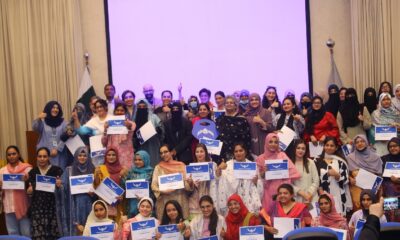
 Happenings2 months ago
Happenings2 months agoEmpowering Women Through Mobility
-

 Fashion2 months ago
Fashion2 months agoFashion Shoot
-
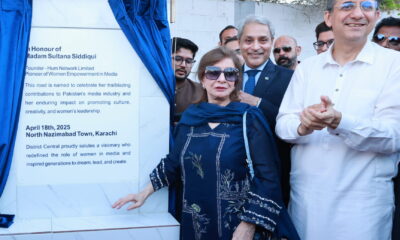
 Happenings2 months ago
Happenings2 months agoKarachi names road after Sultana Siddiqui
-

 Cover story2 months ago
Cover story2 months agoAhsan Khan – The Shape-Shifter of Diverse Roles
-
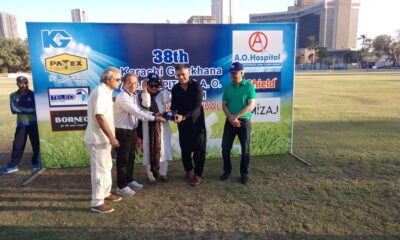
 Happenings2 months ago
Happenings2 months agoKarachi Gymkhana, A.O. Hospital and Clinic-South Host Cricket Festival 2025
-
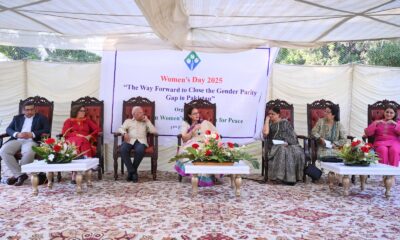
 Uncategorized2 months ago
Uncategorized2 months agoPakistan Women’s Foundation for Peace

